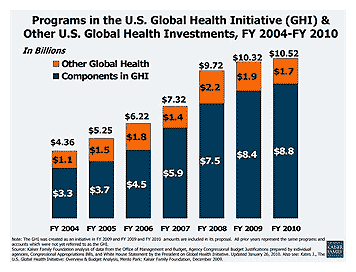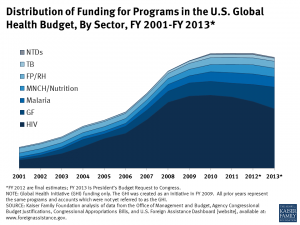A Reporter’s Guide to U.S. Global Health Policy: Background on Financing
The U.S. government will spend an estimated $10.5 billion on global health activities in FY 2010, representing less than 1% of the total federal budget. Funding has more than doubled from the $4.4 billion spent in FY 2004, driven in large part by a growing commitment to address HIV/AIDS following the initiation of the President’s Emergency Plan for AIDS Relief (PEPFAR) by President Bush in 2003. U.S. global health funding includes health-related development assistance provided to low- and middle-income countries in the form of grants or loans, commodities (such as medicines and supplies), and technical assistance.
 The vast majority of U.S. funding for global health is for programs included in President Obama’s Global Health Initiative, which proposes to spend $63 billion over six years, with a greater emphasis than prior efforts on maternal and child health, family planning, and neglected tropical diseases. Funding for programs in the GHI increased from $8.4 billion in FY 2009 to $8.8 billion in FY 2010, and the president’s budget request for FY 2011 proposes growth of $741 million. The proposed budget calls for substantial increases in nutrition ($125 million, or 167%), neglected tropical diseases ($90 million, or 138%), and maternal and child health ($226 million, or 48%). Funding for HIV/AIDS would grow by $196 million (3.6%), while the U.S. contribution to the Global Fund would fall by $50 million (-4.8%).
The vast majority of U.S. funding for global health is for programs included in President Obama’s Global Health Initiative, which proposes to spend $63 billion over six years, with a greater emphasis than prior efforts on maternal and child health, family planning, and neglected tropical diseases. Funding for programs in the GHI increased from $8.4 billion in FY 2009 to $8.8 billion in FY 2010, and the president’s budget request for FY 2011 proposes growth of $741 million. The proposed budget calls for substantial increases in nutrition ($125 million, or 167%), neglected tropical diseases ($90 million, or 138%), and maternal and child health ($226 million, or 48%). Funding for HIV/AIDS would grow by $196 million (3.6%), while the U.S. contribution to the Global Fund would fall by $50 million (-4.8%).
Since 2001, U.S. funding has increased in all major global health categories, driven in large part by growth in HIV/AIDS spending. Spending on HIV/AIDS represents 62% of all U.S. GHI spending in FY 2010.
The vast majority of U.S. global health funding (86% in FY 2010) is oriented towards bilateral assistance (i.e., aid provided directly to other countries) rather than through multilateral institutions (such as U.N. agencies or the Global Fund).
The U.S. is the single largest provider of health assistance to low- and middle-income countries, accounting for 27% of all bilateral commitments in 2007 (European nations collectively contribute 28%, in addition to 5% contributed by the European Commission). As a proportion of GDP, the Netherlands contributed the most for global health in 2006 and the U.S. ranked 10th. Overall, health-related development assistance by Organization for Economic Co-operation and Development (OECD) member countries totaled $22.1 billion in 2007, more than tripling from $7.2 billion in 2001. Health represented 18% of overall development assistance in 2007, up from 13% in 2001.
For more information:
Kaiser Family Foundation report on the architecture of U.S. global health policy and funding.
Kaiser reports on donor funding for global health.
Statement by President Obama announcing the Global Health Initiative.
Kaiser overview of the Global Health Initiative.
Kaiser global health budget tracker.

